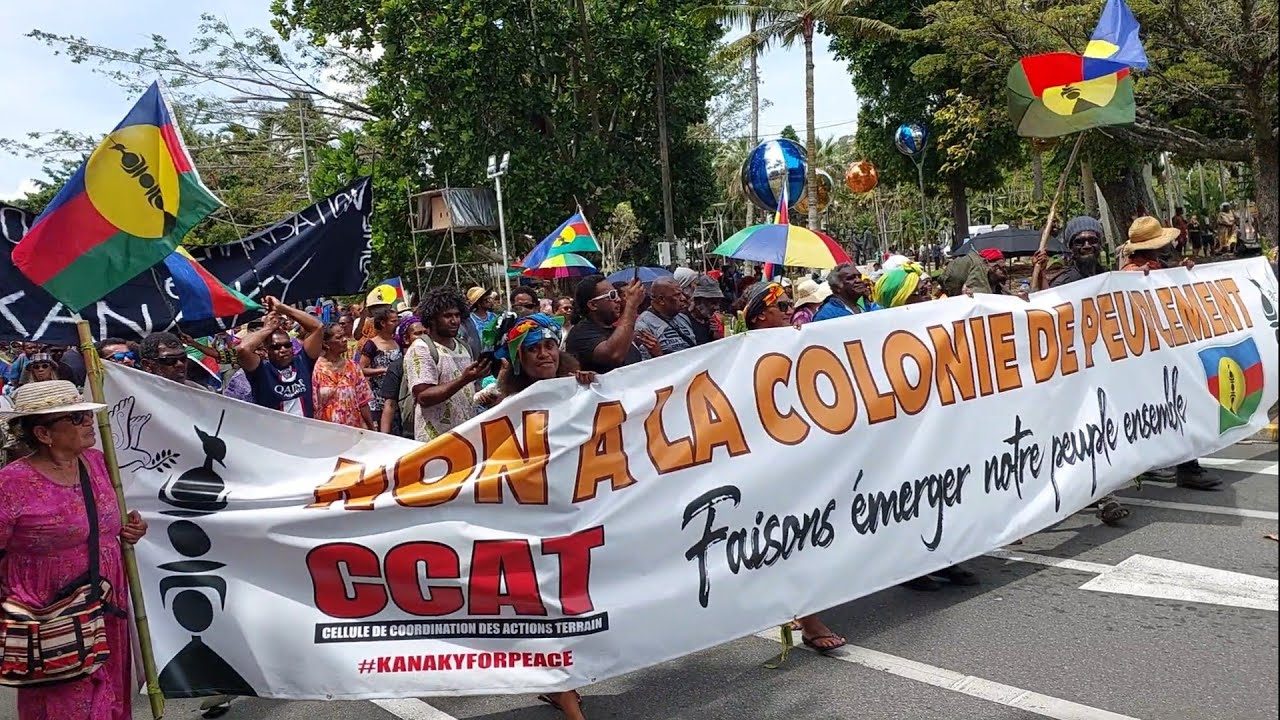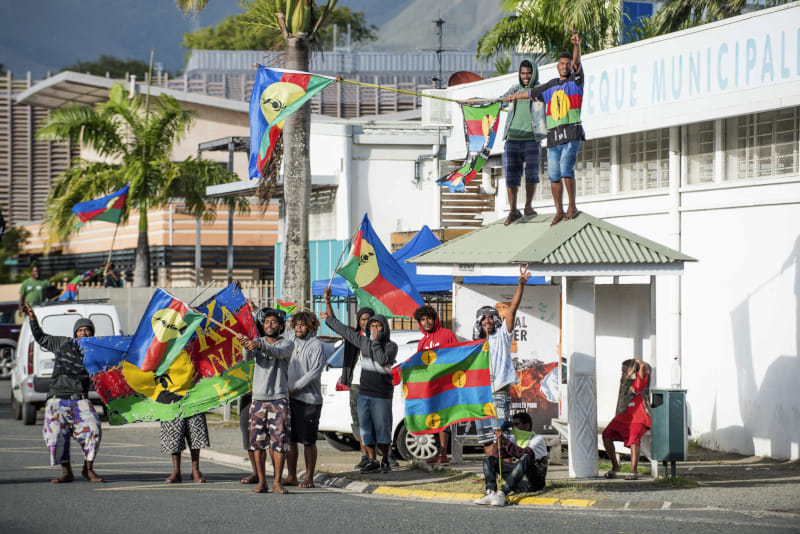Written by: Collectif Solidarité Kanaky on 17 May 2024
The events in New Caledonia, to which France has just sent some two thousand police, are both a legacy of French colonialism, and an extension of France’s alignment with the US imperialists against the growing influence of China in the region.
The US wants to strengthen France’s capacity to deny independence to the Kanaks, fearing that an independent Kanaky might seek closer ties with China.
At the same time, French prestige is at stake: France still sees itself as a Pacific power as it did when it used the Pacific as a lake for the testing of nuclear weapons.
The unfreezing of the electorate by the French National Assembly granting citizenship to French citizens with ten-year’s residence in New Caledonia could increase the anti-independence vote by 15%.
This report is from the French-based Solidarité Kanaky collective, which is supported by ICOR affiliate Union Prolétarienne Marxiste-Leniniste (Marxist-Leninist Proletarian Union). We have translated it from French using online translation services, so the text may not read all that fluently – eds.
For the independence of Kanaky/New Caledonia: no to unfreezing the electorate! no to recolonization!
By Collectif Solidarité Kanaky
The constitutional bill to unfreeze the Caledonian electorate is being debated over the past two days in the National Assembly. This law is understood in New Caledonia as a desire to put an end to the decolonization process initiated by the Nouméa agreement. Result: a rise in tensions, multiple and powerful mobilizations throughout the country, and the threat of a conflagration. The Solidarité Kanaky collective is calling on parliamentarians to withdraw this bill.
Paris on May 13, 2024,
To try to stop this dangerous process for the future of the Kanak people, the elected representatives of the Congress of New Caledonia met this Monday, May 13 and managed to adopt, by a majority, a resolution requesting the withdrawal of this bill. on the electorate. Elected officials remind the State that they are mostly against this bill.
30 years after the Nouméa Accord , as well as the transfer of skills and their rebalancing, inequalities remain very significant, the non-respect of priority to local employment: in many sectors, it is the metropolitans (French citizens – eds.) recently arrived in New Caledonia, due to attractive conditions (salary level and indexation, advantages in terms of housing or installation support), who occupy positions to the detriment of Kanak workers with equal skills. Thus continues a long tradition of privileges offered to French people going to work overseas.
These are conditions which make it possible to strengthen the settler colony that this Pacific territory has always represented for the French state. This is in total violation of international law. Indeed, Kanaky/New Caledonia remains a non-autonomous territory under international law, as such included on the list of countries to be decolonized according to United Nations resolution 15-14.
The Nouméa Accord is a decolonization agreement. It provided for 3 self-determination referendum consultations. The second referendum showed, in 2020, a surge in pro-independence votes: by only 9,000 votes, the “Yes” to the full sovereignty of New Caledonia was in the majority.
The conditions of the third and final referendum, at the end of 2021, are today still contested by all the independence movements, which had requested following the Covid epidemic and the confinement which prevented any campaign, the postponement of the consultation and the respecting both Édouard Philippe's promise to keep it in 2022 and the Kanak mourning period. This 3rd referendum is not recognized by the separatists who did not participate in the vote. A complaint is planned on this subject to the International Court of Justice.
Today , the French government has decided to use force. It unilaterally presents two draft laws on the institutional future of Kanaky/New Caledonia which put at stake the future of the Kanak people, and the stability of the country. They are aiming for an exit under highly contested and non-consensual conditions from the Nouméa Accord, with the consequence of a considerable worsening of divisions.
The first bill concerning the postponement of provincial elections was adopted last March, the second aims to modify the constitution which is central to the Nouméa Accord; no modification should be made by a unilateral decision of the State, without a global agreement between local political forces.
These bills revive the proven practices of putting the Kanak people in a minority in their own country, for the benefit of a local right which would like to find a majority in its favour by modifying the seats in the Congress of New Caledonia. The State is engaged in a brutal modification of the entire organization of democratic life in New Caledonia. This is a way of promoting the recolonization of the territory and the invisibility of the Kanak people!
In response, in Kanaky/New Caledonia mobilizations are growing against these two bills. More than 80,000 people in the streets on April 13 throughout the country. Historic mobilizations which are driven by the CCAT (Cellule for Coordination of Field Actions), which brings together all the independence currents. The objectives are clear: the request for the withdrawal of the bill on the unfreezing of the electorate, the non-recognition of the 3rd referendum, and the continuation of the decolonization trajectory.
This forceful move by the French state brings back sad memories and promotes an extremely dangerous dynamic of tension. The May 1 mobilization was massive and this year marked politically by this political context. The week of May 4, 2024 until May 13, 2024, was a week of continued mobilizations and actions by the CCAT. Started on May 4, 2024 – for the anniversary of the death of Jean-Marie Tjibaou on May 4, 1989, and the anniversary of the massacre of the 19 of the Ouvéa cave on May 5, 1988 – until the presentation of the text to the National Assembly this May 13, 2024. Rallies in front of all the country's gendarmes on May 5, 2024, marches in different cities every day. Many mines are already blocked, such as in Houailou and Thio. The mobilization is entering its 3rd phase.
On May 13, 2024, the two federations USTKE, THT (Air and Land Transport, Hotels) and Ports & Docks went on strike, followed by 99%.
At the port, only essential goods are released (perishable goods and medicines), all port companies have decided to close at 3 p.m. Slowing economy today. The Wetr chiefdom in Lifou has decided to close the island's airport.
At the Tontouta airport, plane flights were seriously delayed due to employees leaving their posts, disrupting the operation of services at the airport. The CCAT’s mobilizations on road access have also disrupted the country. The country is mobilizing everywhere, with roadblocks.
A mutiny broke out at the East Camp prison, where three guards were taken hostage and the RAID intervened.
Young people clashed with the police and mobile gendarmes, who fired flash-bullets at them, provoking their anger.
The country is experiencing extreme tension as it awaits the vote in the National Assembly.
Furthermore, repression is strong. A number of people prosecuted since the demonstration on 21 February went on trial on 19 April at the Nouméa Court, receiving very heavy sentences. Two demonstrators are being held in the East Camp, while five other demonstrators are free but wearing electronic bracelets. Since then, there have been a number of arrests, some people have been released but are still being prosecuted, while others are being held in pre-trial detention or in police custody. They are political prisoners!
On Monday 13 May 2024, 18 people were due to appear in court, but the trial was postponed, some simply because they were carrying the Kanaky flag! Unheard of!
The Solidarité Kanaky collective, created in 2007, brings together different associative, trade union and political organizations with the objective of organizing solidarity in France with the Kanak people in their trajectory of decolonization. Alongside the various pro-independence currents, we reaffirm our solidarity with the union and political struggles of Kanak and non-Kanak separatists, against the colonial, racist, capitalist and repressive situation of the French State in Kanaky….
This bill must be withdrawn.
Let us demand the release and dropping of charges for those accused of the current mobilizations.
Let's take solidarity actions here in France against the two bills and in solidarity with the current movement in Kanaky.
Solidarity with the CCAT and the mobilized Kanak people!



No comments:
Post a Comment